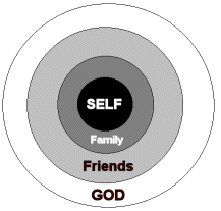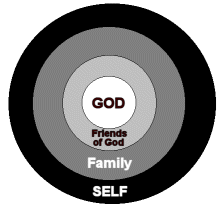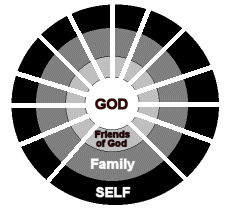


 385
Yahweh Comes in the Dark
385
Yahweh Comes in the Dark

Sabbath Day Sermon, Saturday 9 March 2002

Every person in their life at some point is faced by hard questions. And some of those questions may be a matter of life or death, whether spiritually, physically, or both. This passage of scripture both shocks us and challenges us as we look down on a desperate Job who is suffering unspeakably, having lost everything. And then his wife hurls this challenge at him, almost mockingly: "Do you still hold fast to your integrity? Curse God and die!"
Would he, do you think? Would he die if he cursed God? Would he, out of all the pain, misery and loneliness of the appalling collapse about his ears of everything he valued in life - his health, his wealth, his home and his family - would he suddenly or even slowly, fold up if he cried out that God was a liar, a cheat, or a tyrant worse than any Cyrus, Stalin or Hitler, beating down the helpless? Well, you know he wouldn't! We have all heard men curse God and go on living, go on living indefinitely, recklessly, and even profitably. So what is this woman talking about, when she says, "Curse God and die?"
First, I would have you notice that this is a woman speaking. It is Job's wife. It is the person who lived closest to Job and read Job, not only his actions but his motives, not only his mind but his heart, not only what he said, but what he thought, as only a woman can. She knew then about her man's faith (more than perhaps he knew himself?), she knew how deep it was, how strong it was, how part of his very self it was. This woman knew that for this man life without his faith was impossible. There would be no life - no life that could be called life - even though he might live physically, only a living death, only a dragging around with emptiness in the heart of everything. This is the terror of once having been gripped by faith in the living God. You can never really again live without it. "Curse God and die" urged the woman. Was she right or was she wrong? No, not was she right or wrong to urge it, but was she right or wrong in her prophecy of the consequences of cursing! I submit to you that she was dead right ... for Job.
But was she right to urge it in the light of her conviction about the consequences? Was she right to urge that Job take his own life as a way out of his misery? Was she right to counsel a form of suicide? Was she right to press on her husband the strike weapon against Yahweh - "I won't damn well live if this is how you treat people!"
Now these are all pretty shocking questions - questions as shocking as the reaction of Job's wife itself. I am sure we are not the first to be mystified by her behaviour. So we need to pause here to consider this woman. Why did she say to her husband, "Curse God and die?" Was it because her heart bled for him? Was it not that she could not bear another day to see him pitifully scraping those pitiful boils of his to ease his pitiful pain a little? - and all to no advantage? "Oh, better die than this!" she may have thought to herself. "Better to be a widow, better to be a woman and be easy prey to all the rapacious, money-loving, lust-loving, hateful men in society than bear this pain another day or watching one you dearly love driven down to desperate degradation. I think we have assessed this woman shamefully if we do not assess her cry, "curse God and die" as spoken out of love - love for her man who had given her everything in life she prized. But was she right to urge it? Is a course of action right simply because it has its roots in human love? Does love justify everything we say or do? This is a hard question, but nothing like so hard as having to refuse a way out of a wilderness which love seemingly offers and to refuse it in order to seemingly maintain cold integrity. "O Lord, lead us not into temptation."
And you will notice that Job does refuse. His reply was severe: "You speak as one of the foolish women speaks. Shall we indeed accept good from God, and shall we not accept adversity?" (Job 2:10, NKJV). He is saying to her: "It is not like you to talk like this. You are putting yourself in the opposite camp where I know you do not belong, and I appreciate why you do it, and the cost to you, but you counsel is wrong".
Are we not reminded here of how well-meaning Peter wanted to stop Yah'shua (Jesus) from going to Jerusalem to die? He acted out of human love but not God's will, and he received a stinging rebuke for his trouble: "Get behind me, Satan!" (Mt.6:23; Mk.8:33; Lk.4:8). Too often we judge from a narrow perspective because we are seeing things only through the lenses of self. And the lenses of self are the worst possible way to judge truth. They are the way that Satan wants us to judge and so put a block before the work of God. Job's wife and Peter both judged out of their feelings - their very fallible human feelings - because neither were listening to Yahweh any more on accoutn of the pain they were suffering. Pain has a tendency to render us spiritually blind if we are not careful. And I suspect, had Yah'shua (Jesus) been there, we would have rebuked Job's wife as severely as He did Peter.
"In all this Job did not sin with his lips", the Bible tells us. He was right to bypass his feelings in this instance and to have his soul focussed on the righteousness of Yahweh in spite of the apparent contradiction around him. And there will be times in everyone's life when we are surrounded by apparent contradiction. At such times we are both being put to the test as well as being offered a chance to meet God.
The counsel of the wife of Job was wrong and Satan used her in a bid to destroy both her husband and herself. The words sounded reasonable in the light of everything that had happened. They had the appearance of love, but they were counterfeit. Whether she expected her husband to take her advice or not is probably not difficult to figure out - I don't suppose she really did, and yet would she have suggested the course of suicide if for a fleeting moment she had not believed it? I expect her soul was divided right down the middle - the one rational side knowing she was talking insanity and the other utterly blind to it because of her feelings. Hers is a classical case of internal warfare - of one side of her believing one thing and another believing another. Hers is a perfect example of the dilemma of the human condition, of the confusion that results when we lose our God-focus and trust in the arm of flesh instead, whether they be out feelings, ratioanlisations, psychic instincts, or whatever. And that is what the heart can sometimes be when it has lost its proper place in the hierarchy of the soul.
Come what may of darkness, doubt and despair, we must still trust the Almighty to see us right, because it is only by Him that we live at all. The whole Book of Job shouts this message. This man had many comforters - many advisers - all of whom gave him bad advice because they were all too spiritually shallow. Eliphaz the piously pompous. Bildad, the narrowly orthodox. Zophar the blustering talker. Perhaps also Elihu, the young man who thought he knew all the answers. Four men, all talking principle. But there was a fifth comforter who offered the wrong comfort to a man in misery, a woman, this woman, his wife, but she spoke out of human love only, and not from principle. Her appearance is brief but her counsel equally as deadly as the men's, if easier to untangle. And it came before the men's. Satan's first line of attack was through plain and straightforward feelings. Only when that had failed did he go to extraordinary lengths to deflect Job through hours and hours of mental rationalisations through his friends, his second line. He began with Job's nearest and dearest survivor - his wife, the only one capable of comforting him for the loss of his children, and who knew him better than anyone else. He struck straight at the heart by an appeal to emotion and to a twisted sense of self abdegnation and sacrifice. And I doubt she was entirely conscious of what she said. I doubt that her words were the result of long and careful meditation. They were likely the culmination of pressure brought to bear on her broken heart as she watched her husband suffering day by day and simply wanted to relieve him. It must have built up like the rising waters of a lake behind a dam until finally, confused and desperate, she counselled the very thing she knew deep down her husband would refuse - counsel so desperate that it forced him to choose between her and the Lord.
We live in a world today where the kind of attitude reflected by Job's wife is common amongst not only the women but many of the men also. We live in a world of gut reaction and not careful thought. But even when you do meet the male principle of careful thought you invariable meet Job's friends. In recent times my family has been shocked by the behaviour of some of the people we thought we knew well. One man, whom we came to greatly respect for the integrity of his mind and heart, suddenly, and without any warning, lost his grip and began to behave like Job's wife, attributing fleshy feelings to the "Holy Spirit". We could hardly believe what we heard from him. And yet it happened. And it happens all the time. It is the human condition.
Yahweh has given us a mind with which to think and a heart with which to feel. We can choose whether we think and feel righteous thoughts and feelings or unrighteous ones. We can rationalise for good or evil, and we can love or hate. And we can seek the middle road of finding the right balance between the two. But if we think we can live life happily and securely just using our thoughts and feelings, we will be greatly mistaken. Stories like that of Job are to remind us that life is more than about the thoughts and feelings of human beings going about their daily business without reference to a greater purpose. We are reminded that there is more to the individual, the family, our wider circle of friends, and humanity. We are reminded that the only meaning that exists, whilst it begins with self, must reach outwards to our family, to friends, and finally to the great cause of everything - Yahweh Himself, our Creator and Heavenly Father - that we can't define our circle of relationships without harming ourselves. Job's wife, on that occasion, made a serious error. But I am sure that before this disaster struck Job, she was a model wife. I am positive of it, though I only have faith to back up that contention. And I am sure that Job's four friends were basically good people, until they tried to rationalise Job's condition. Doubtless they had been supportive of him up until that point, until they too deserted the pain sense that Job was a good man and that he was not being punished for his sins.

Growing up is about, first, discovering who you are, and then moving out to embrace more and more people until you have embraced God. As the diagram illustrates, we begin our existence with a core called the "Self" or "Ego". Our first experience with others is with our immediate family - parents, siblings, grandparents, aunts and uncles. In time this circle widens to include friends until finally we make contact with Yahweh, the Eternal God. We discover who we are only be interacting with people and learning to love them, both those who are loveable and those who are not. We learn to give of ourselves and so crystallise out a Self.

Now as Yah'shua (Jesus) teaches us, the ego is basically self-serving. It is greedy, inconsiderate, and destructive, which is why He taught us to renounce self and to make a complete change-around as shown in the second diagram. We are taught by Yahweh, His Son, His apostles and prophets, that true happiness can only be found when, having discovered the existence of God, we invert everything. Instead of Self becoming the core of our being, God does. All our priorities are reversed. Even our friends undergo a filtering process so that our priority on the next level is the friends of God, the redeemed in Christ. However, this rarely happens all at once. All of us, like Job, are tested to see where our true values lie.

The third diagram shows Job stripped of friends and family, who had become spiritual hindrances to him, leaving him to contend with God face-to-face, as it were. Through this most painful time, which cost him everything that he had previously considered important, he discovered life. By refusing to curse God and die, by not finding a satisfactory answer to all the tortuous puzzles about him, GOD FOUND HIM. He was found by Yahweh and lived again! I repeat - and please underline this mentally with a huge, think marking pen - HE WAS FOUND BY GOD, and it came in a way that he least expected.

Every single one of us has ideas about how God is. We learn things from our parents, our friends, from school, from books, and from many other sources. For the most part God is just a collection of facts for most people. And everyone's picture of Him differs according to the personality and experience of each individual. And that is because God is defined by self, as in the first diagram. It's not really God we are seeing but a kind of fantasy picture. The real God is not revealed until - firstly, our priorities are reversed (the second diagram), and secondly, he puts us through a tough test that strips away all illusion so that we can see Him for what he really is (the third diagram). And then He restores us to where we were but this time with a CLEAR VISION and a NEW HEART, as shown in the fourth diagram. And when you have attained this, you will discover that you cannot reason, organise or engineer your way to Yahweh. Instead, Yahweh comes to us how and when He will, though it is right to prepare for His coming. And that is the whole purpose of CHURCH or ASSEMBLY DISCIPLESHIP.
You may imagine that Yahweh will come to you in a particular way but you will almost certainly be wrong. When He comes, it is as a thief in the night - unexpected and unannounced. Now what cover do most thieves like to use most of all in order to effect their burglary? Darkness! They usually come at night, so as to remain concealed. Yahweh comes to us when everything seems as dark as dark can be - which is why I have coloured the "Self" rings black in the diagrams. For that is usually the time when we are most receptive to Him, when the walls of ego, pride and stubbornness have come down and we are genuinely crying to be rescued. The darkness may be intense and short, or it may be a twilight over many years, or a mixture of both. But either way, Yahweh is breaking down our walls of resistance so that we can meet Him and really come to know Him. If it takes a while, it maybe because you are fighting Him. It may happen when you are young or it may happen when you are old. Only He knows when you are ready. But when you have met Him, the fruits of that meeting will be obvious to everyone, for a person who has met God has a genuine heart for people - to serve them in a selfless way both in the daily activities of life and in bringing a witness of the message of salvation. For they will want above all else that people should experience what they have experienced and be free. The moment of darkness will reveal the brilliance of the true light so that you can never forget it.
But first there has to be a change of heart - a recognition that our lives are being steered by selfishness and that our image of God is only that - a human image. It means that, through an act of will, surrendering the sovereignty of self by reversing all our priorities. It is not easy, but if some with sincere intent, Yahweh will clear the path for you to do so. It will take effort, persistence, and a determination to see the job through. It means being willing to get into the thick of battle for your soul and overcoming carnal, sinful ways. The process will differ from individual to individual, but it is a process nonetheless.
The story of Job ends on a happy note. He understands how foolish he has been and declares:
"I know that you can do all things; no plan of yours can be thwarted ... My ears have heard of You but now my eyes have seen You" (Job 42:2,5, NIV).
This, brethren and sisters, is the difference between factual information about God - from hearing, dreaming, reading and maybe even having visions about Him - and actually living a life in Him. The reality of God is in a changed life that is at once seen to be full of love, compassion and energetic service. The reality of Yahweh is inner peace, joy and a sense of oneness with His people. The reality of Yahweh is entering the communion of the saints, the forgiveness of sins, and fellowship with the Ruach haQodesh (Holy Spirit). The reality of Yahweh is to be at home with Him and His people and to attain the ultimate sabbath. Amen.


This page was created on 8 March 2002
Last updated on 8 March 2002
Copyright © 1987-2007 NCCG - All Rights Reserved



